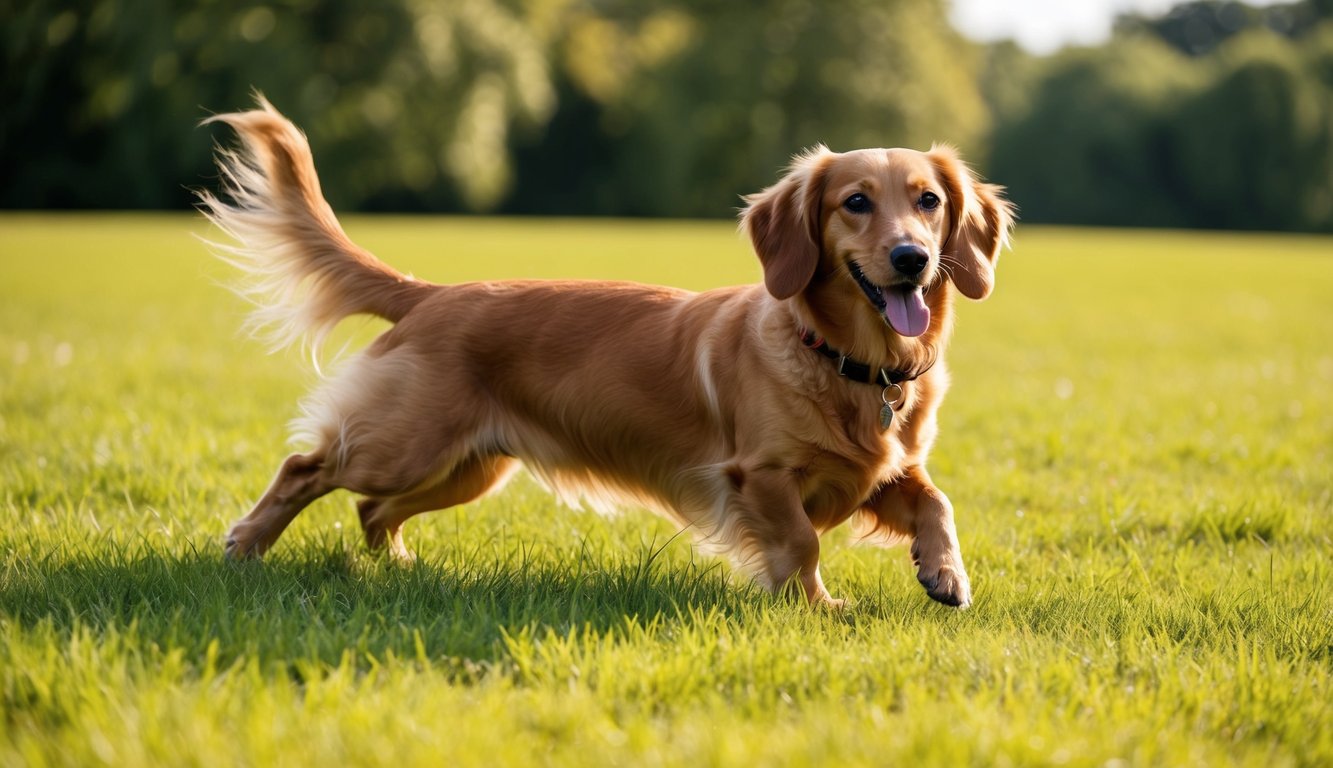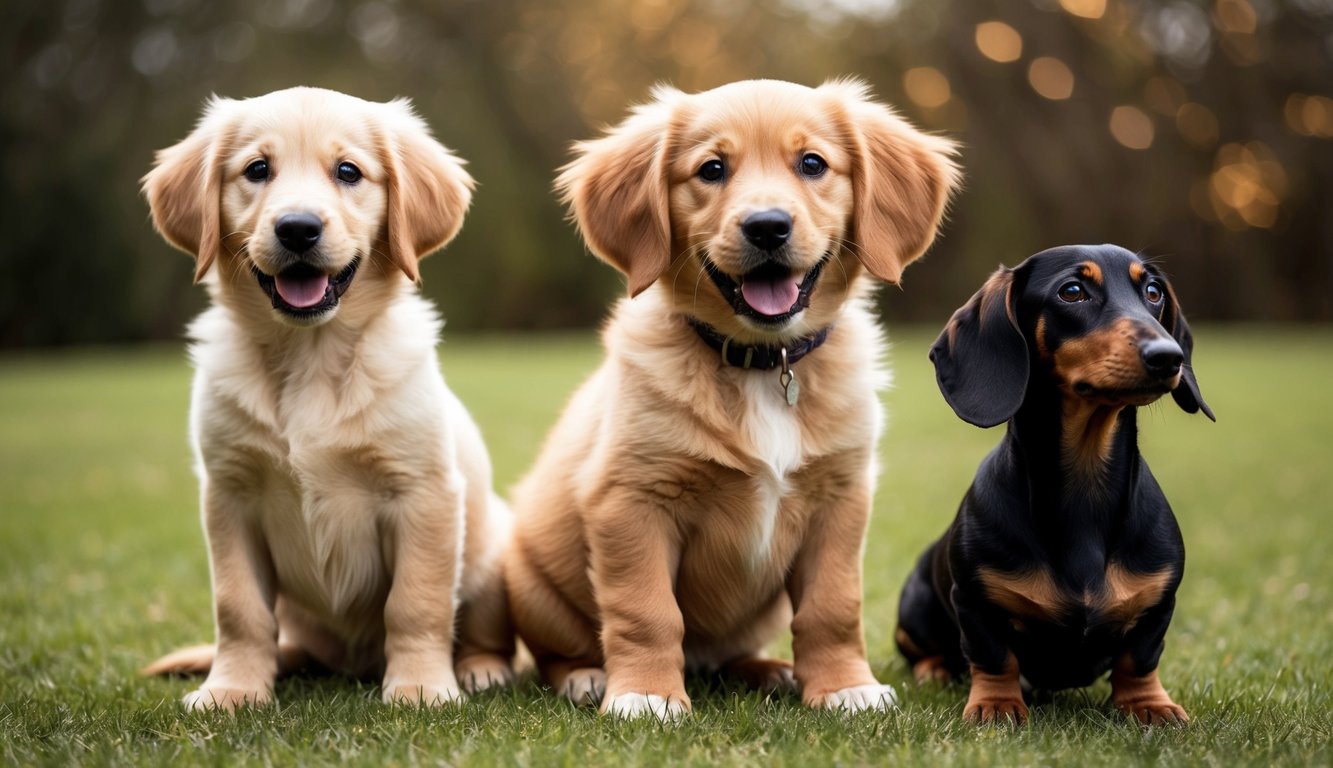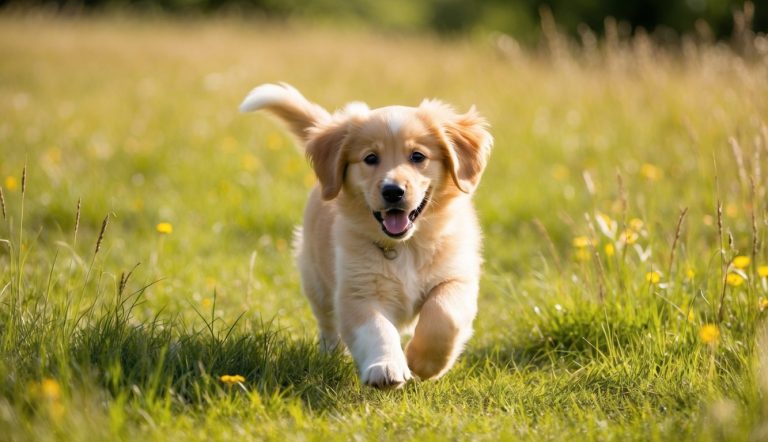The Golden Dox is a small to medium-sized dog that combines the loving nature of a Golden Retriever with the distinctive body shape of a Dachshund. These intelligent and affectionate mixed-breed dogs make wonderful family pets while requiring moderate exercise and grooming. Let’s take a look at this amazing and cute breed.
If you’re still on the market to buy a Golden Dox, PuppySpot currently offers a $300 discount using the code PUPPY300, just click the banner below!
Origin and Breed History
- The Goldendox emerged in the 1980s during the rise of designer dog breeds. This mix combines two breeds with rich histories – the Golden Retriever from Scotland and the Dachshund from Germany.
- Golden Retrievers were originally bred as hunting dogs, specifically for retrieving waterfowl. Their gentle mouth grip made them perfect for this task.
- Dachshunds were bred to hunt badgers and other burrowing animals, which explains their long, low bodies and determined personalities.
Physical Characteristics
The Goldendox typically stands 10 to 23 inches tall and weighs between 30 to 60 pounds. Their size can vary significantly depending on which parent breed’s genes are more dominant.
Their coat may be:
- Short to medium length
- Straight or slightly wavy
- Water-resistant
- Double-coated with a soft undercoat
Common coat colors include:
- Golden
- Cream
- Red
- Black
- Brown
Temperament and Personality Traits
These dogs inherit friendly and social traits from both parent breeds. They form strong bonds with their families and typically get along well with children. Goldendoxes display a mix of their parents’ instincts – they might show interest in both retrieving and tracking activities.
They are usually:
- Intelligent and trainable
- Social and outgoing
- Loyal to family members
- Alert and protective
- Energetic and playful
These dogs need regular mental stimulation to prevent boredom and maintain good behavior.

Health and Lifespan
The Golden Dox inherits health traits from both parent breeds and typically enjoys good health with proper care. Regular vet check-ups help catch potential issues early.
Common Health Issues
- Golden Dox dogs can develop back problems due to their mixed body structure. Their spine needs extra protection to prevent injury.
- Hip dysplasia and joint issues may appear, especially in dogs that take after their Golden Retriever parent.
- Dental problems are common. Daily tooth brushing and regular professional cleanings help maintain oral health.
- Some Golden Dox dogs experience eye problems like progressive retinal atrophy or cataracts. Regular eye exams can detect these conditions early.
Average Lifespan
- The Golden Dox lifespan ranges from 10 to 14 years. Many live longer with proper care and good genetics.
- Mixed breeds often enjoy better health than purebred dogs due to genetic diversity.
- Diet and exercise habits greatly impact longevity. Active dogs maintain healthier weights and stay mobile longer.
Preventive Care and Vaccinations
Core vaccines protect against parvo, distemper, and rabies. Puppies need a complete vaccination series. Schedule vet check-ups twice yearly after age 7. Senior dogs need more frequent monitoring.
Important preventive measures:
- Monthly heartworm prevention
- Regular flea and tick treatments
- Weight management
- Daily exercise
- Dental cleanings
- Nail trimming
Keep detailed health records and stay current with booster shots.
Care Requirements
The Golden Dox requires regular care to stay healthy and happy. Daily exercise, balanced nutrition, and consistent grooming help maintain their physical and mental well-being.
Feeding and Nutrition
- A balanced diet supports healthy skin, shiny coats, high energy levels, and clean teeth in Golden Dox dogs. Feed them high-quality dog food designed for medium-sized breeds.
- Adult Golden Dox dogs need 2-3 meals per day. Portion sizes depend on their weight, age, and activity level.
- Monitor their food intake carefully. These dogs can gain weight easily due to their Dachshund genetics.
- Fresh water should always be available. Clean and refill water bowls daily.
Exercise Needs
Golden Dox dogs are active and energetic. They need 45-60 minutes of exercise daily.
Split exercise into shorter sessions to protect their long backs. Mix activities like:
- Short walks
- Fetch games
- Mental stimulation toys
- Light swimming
Avoid high-impact activities or jumping from heights. Their Dachshund body structure makes them prone to back problems.
Grooming and Maintenance
Brush their coat 2-3 times weekly to remove loose fur and prevent matting. Use a medium-bristle brush or slicker brush. Bath them every 6-8 weeks or when dirty. Use dog-specific shampoo to protect their skin.
Additional grooming needs include:
- Trim nails every 2-3 weeks
- Clean ears weekly
- Brush teeth 2-3 times per week
- Check and clean eyes daily
Watch for signs of skin issues or ear infections, which can be common in this mix.
Training and Socialization
The Golden Dox combines intelligent traits from both parent breeds, making them responsive to training while needing consistent positive reinforcement. Early socialization helps prevent stubborn behaviors and ensures a well-adjusted adult dog.
Training Techniques
- Golden Dox puppies learn commands quickly and respond well to positive reinforcement methods. Begin training as early as possible to establish good habits.
- Use treats and praise to reward desired behaviors. Short, frequent training sessions work better than long ones due to their moderate attention span.
- Basic obedience training should focus on essential commands like sit, stay, come, and leash walking. These dogs can be stubborn at times, inheriting this trait from their Dachshund parent.
- Consistency is key – all family members should use the same commands and rewards to avoid confusing the dog.
Socialization Importance
Proper socialization in the first few months helps create a well-behaved family companion. Expose your Golden Dox puppy to different:
- People of various ages
- Other dogs and pets
- New environments
- Different sounds
- Various surfaces and textures
Early exposure prevents fear-based behaviors and anxiety later in life. Take your puppy to puppy classes or organized playgroups for controlled social interactions. Regular walks in new places help build confidence and social skills. Keep interactions positive and never force your dog into uncomfortable situations.

Suitability for Families and Households
The Golden Dox combines the gentle nature of Golden Retrievers with the spunky personality of Dachshunds to create a wonderful family companion. Their adaptable nature and moderate size make them suitable for various living situations.
Interaction with Children
- Golden Dox dogs are patient and gentle with kids. They inherited the friendly temperament of their Golden Retriever parent, making them excellent playmates.
- Adult supervision is needed during playtime since these dogs can be sensitive to rough handling. Their backs require special care due to their Dachshund heritage.
- Teaching children proper pet handling techniques helps create a safe environment for both the dog and kids. Gentle petting and calm interactions work best.
Compatibility with Other Pets
- These mixed-breed dogs typically get along well with other dogs. Their social nature comes from both parent breeds.
- Early socialization helps ensure positive relationships with other household pets. Proper introductions are essential when bringing new pets home.
- Some Golden Dox dogs may show interest in chasing smaller animals due to the Dachshund’s hunting instincts. Training and supervision can help manage this behavior.
Housing Requirements
Golden Dox dogs adapt well to different living spaces. They can thrive in apartments or houses as long as they get enough exercise. A fenced yard provides a safe space for play and exploration. The fence should be secure to prevent digging, a trait inherited from Dachshunds.
Indoor requirements:
- Non-slip flooring
- Comfortable bed
- Easy access to water
- Safe play area
Stairs should be limited to protect their backs. Ramps can help them access furniture or elevated areas safely.




